第四讲 汉英句子翻译1
第四章 汉译英的标准及译文
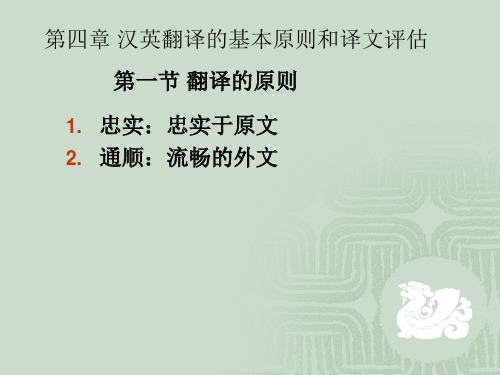
例2. 你们谁想参加春游就在星期五之前报名并交费。 原译:You whoever wants to go spring outing please sign up your name and pay dues before Friday.
译文1:Whoever wants to join the spring outing should sign up and pay the expenses before Friday. 译文2:Those of you who want to go on the spring outing are required to sign up and hand in the payment before Friday. 译文3:If any of you wants to take part in the spring outing, please sign up and pay for it before Friday.
例2. 在战争期间,他私藏了许多珍贵的物品。
In wartime, he accumulated many scarce items. 改译: In wartime, he hoarded many scarce items.
例3I am deeply grieved to hear that your mother kicked the bucket. 改译: I am deeply grieved to hear of your mother’s death.
那男孩大约八九岁。 例6.那男孩大约八九岁。 那男孩大约八九岁
译文: 译文: The boy was about eight or nine years old. 改译: 改译:The boy was eight or nine years old. 他一两个星期后来。 例7.他一两个星期后来。 他一两个星期后来 译文: 译文:He will come after a week or two. 改译: 改译:He will come in a week or two.
新编实用英语综合教程第四汉译英答案
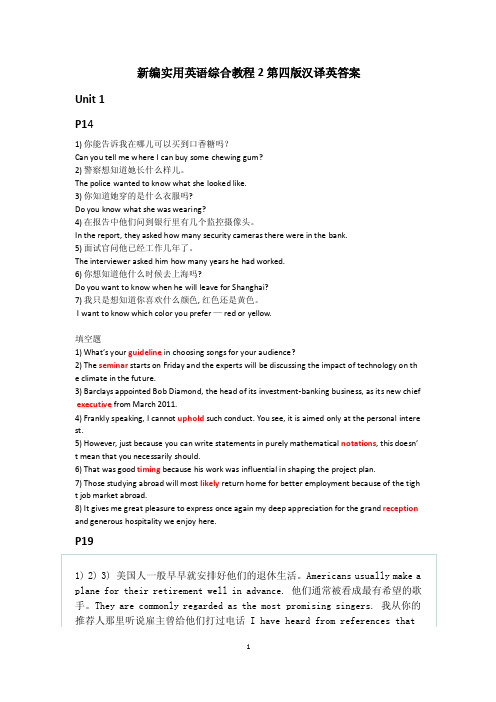
新编实用英语综合教程2第四版汉译英答案Unit 1P141) 你能告诉我在哪儿可以买到口香糖吗?Can you tell me where I can buy some chewing gum?2) 警察想知道她长什么样儿。
The police wanted to know what she looked like.3) 你知道她穿的是什么衣服吗?Do you know what she was wearing?4) 在报告中他们问到银行里有几个监控摄像头。
In the report, they asked how many security cameras there were in the bank.5) 面试官问他已经工作几年了。
The interviewer asked him how many years he had worked.6) 你想知道他什么时候去上海吗?Do you want to know when he will leave for Shanghai?7) 我只是想知道你喜欢什么颜色, 红色还是黄色。
I want to know which color you prefer — red or yellow.填空题1) What’s your guideline in choosing songs for your audience?2) The seminar starts on Friday and the experts will be discussing the impact of technology on the climate in the future.3) Barclays appointed Bob Diamond, the head of its investment-banking business, as its new chief executive from March 2011.4) Frankly speaking, I cannot uphold such conduct. You see, it is aimed only at the personal intere st.5) However, just because you can write statements in purely mathematical notations, this doesn’t mean that you necessarily should.6) That was good timing because his work was influential in shaping the project plan.7) Those studying abroad will most likely return home for better employment because of the tigh t job market abroad.8) It gives me great pleasure to express once again my deep appreciation for the grand reception and generous hospitality we enjoy here.P191) 2) 3) 美国人一般早早就安排好他们的退休生活。
汉英翻译句子翻译PPT课件

14
LOGO
Examples:
长相思 (白居易) 汴水流,泗水流,流到瓜州古渡头。吴山点点愁。 思悠悠,恨悠悠,恨到归时方始休。月明人倚楼。
trans. Everlasting Longing See the Bian River flow, And the Si River flow! By Ancient Ferry, mingling waves, they go, The Southern Hills reflect my woe. My thought stretches endlessly, My grief wretches endlessly, So thus my husband comes to me, Alone on moon----lit balcony. (语音)
Imperatives are sentences which usually have no overt grammatical subject, and whose verb has the base form. They are used to instruct sb. to do sth.
Exclamatives are sentences which have an initial phrase introduced by what or how, usually with subject-verb order. They are used for expressing the extent to which the speaker is impressed by something.
例子:王明是男孩,张薇是女孩,他们都在四班。 (Wang Ming is a boy and Zhang Wei is a girl . Both of them are in Class Four. )
汉英翻译中的短句翻译
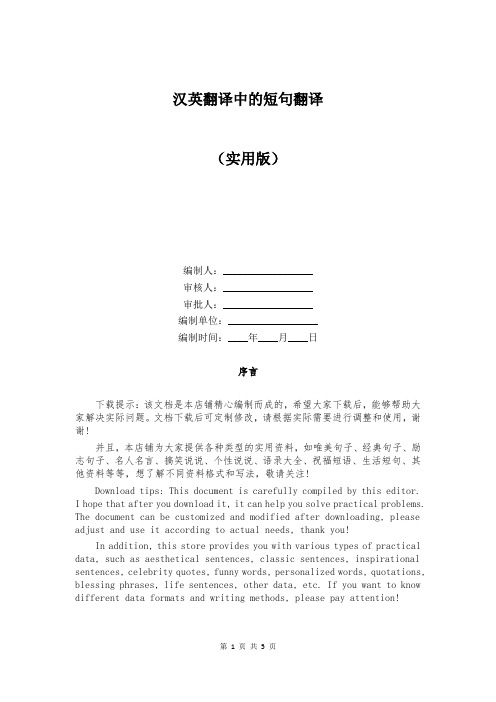
汉英翻译中的短句翻译(实用版)编制人:__________________审核人:__________________审批人:__________________编制单位:__________________编制时间:____年____月____日序言下载提示:该文档是本店铺精心编制而成的,希望大家下载后,能够帮助大家解决实际问题。
文档下载后可定制修改,请根据实际需要进行调整和使用,谢谢!并且,本店铺为大家提供各种类型的实用资料,如唯美句子、经典句子、励志句子、名人名言、搞笑说说、个性说说、语录大全、祝福短语、生活短句、其他资料等等,想了解不同资料格式和写法,敬请关注!Download tips: This document is carefully compiled by this editor.I hope that after you download it, it can help you solve practical problems. The document can be customized and modified after downloading, please adjust and use it according to actual needs, thank you!In addition, this store provides you with various types of practical data, such as aesthetical sentences, classic sentences, inspirational sentences, celebrity quotes, funny words, personalized words, quotations, blessing phrases, life sentences, other data, etc. If you want to know different data formats and writing methods, please pay attention!汉英翻译中的短句翻译1. Can't find out the answer.2. My family can trace to 11 century.3. To feed the children is the responbility of the parents.4. Give up the medicine, set about to study the physics.5. Smoke too much will cause the cancer.2.汉英翻译1. Environmental protection, everybody has a responsibility.2.The protection environment protects us.3.The humanity handle kindlies the nature, is handle kindlies oneself4. The environmental protection starts from my side.5. Acquires the macroenvironment consciousness, protects the ecological environment。
大学汉英翻译教程第四章 句子的英译与常用技巧_46
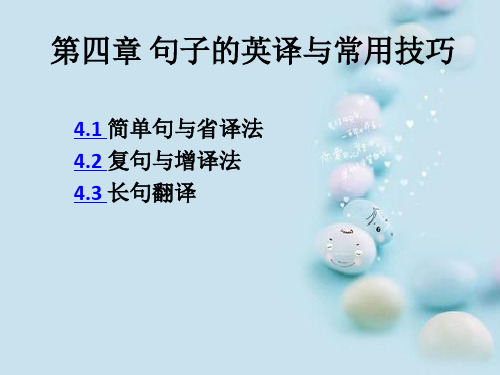
【例3】还有些人不能进领导班子或者不能重用,例如,……革命意 志严重衰退,饱食终日,无所用心的,等等。(邓小平:《邓小平 文选》第二卷)
【例2】科学是老老实实的学学的春天》)
Science means honest, solid knowledge, allowing not an iota of falsehood, and it involves herculean effort and grueling toil.
【例3】所以,人们对于大自然,全都一致并深深地依赖着。 Hence people are all heavily dependent on nature for survival. 【分析】“全都”已经包含了“一致”的意思了,所以,译文 中“一致”并没有再次译出。
【例4】他暗暗下定决心:一定重新做人。 He made up his mind to turn a new leaf in his life. 【分析】“暗暗下决心”不必译成“he made up his mind secretly”,在英文中“make up one’s mind”就可以表达暗暗下 定决心了,如果加上“secretly”反而会让人觉得奇怪。因为下 决心本来就是一种心理活动,所以就不存在“openly”和 “secretly”之分了。
There are also others whom we should not recruit into leading bodies or place in important posts. They include:...and persons whose revolutionary will has waned and who are content to eat three square meals a day and do nothing.
第四课句子解释总结
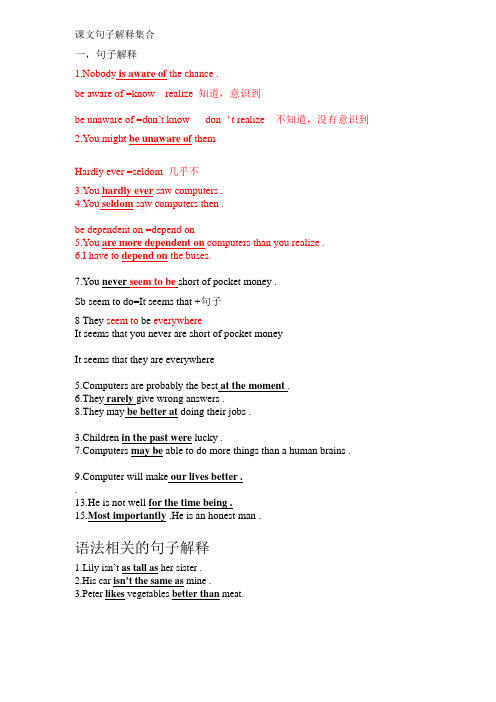
课文句子解释集合一,句子解释1.Nobody is aware of the chance .be aware of =know realize 知道,意识到be unaware of =don’t know don‘t realize 不知道,没有意识到2.You might be unaware of themHardly ever =seldom 几乎不3.You hardly ever saw computers .4.You seldom saw computers then .be dependent on =depend on5.You are more dependent on computers than you realize .6.I have to depend on the buses.7.You never seem to be short of pocket money .Sb seem to do=It seems that +句子8 They seem to be everywhereIt seems that you never are short of pocket moneyIt seems that they are everywhereputers are probably the best at the moment .6.They rarely give wrong answers .8.They may be better at doing their jobs .3.Children in the past were lucky .puters may be able to do more things than a human brains . puter will make our lives better ..13.He is not well for the time being .15.Most importantly .He is an honest man .语法相关的句子解释1.Lily isn’t as tall as her sister .2.His car isn’t the same as mine .3.Peter likes vegetables better than meat.。
lecture 4 英汉互译教程
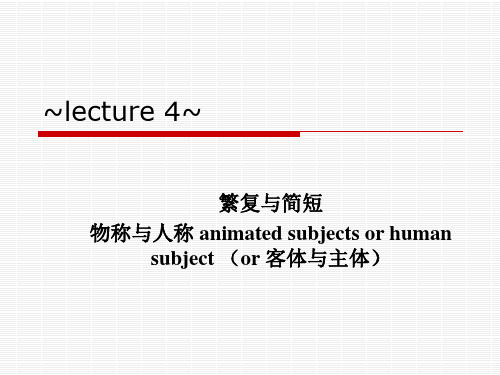
3). 他这时已是将近六旬的人,一表人才,高个儿, 眉清目秀,头发又多又黑,略带花白,恰好衬出他 那堂堂的仪表。 He was at this time in his late fifties, a tall, elegant man with good features and thick dark hair only sufficiently graying to add to the distinction of his appearance.
1). In the doorway lay at least twelve umbrellas of all sizes and colors.
门口放了一堆雨伞,少说也有十二把,五颜 六色,大小不一。 2)There are many wonderful stories to tell about the places I visited and the people I met.
英语注重形合,借助连接手段扩展和组合,形成纷繁复 杂的长句;汉语注重意合,结构流散,但语意层次分明。 英语长句的汉译常常要采用分解、拆散和重组的变通手 段进行灵活处理。 Many man-made substances are replacing certain natural materials because either the quantity of the natural product cannot meet our ever increasing requirement, or more often, because the physical properties of the synthetic, which is the common name for manmade materials, have been chosen and even emphasized, so that it would be of the greatest use in the fields in which it is to be applied.
英汉翻译技巧 lecture04转译法

• An acquaintance of world history is helpful to the study of current affairs. • 读一点 读一点世界史,对学习时事是有帮 助的。
2012-5-23 15
• •
What kind of sailor are you? 你晕不晕船? (be a bad sailor 晕船; 晕船 be a good sailor 不晕船) Careful comparison of them will show you the difference. 比较一下,你就会发现 只要仔细把它们比较 比较 不同之处。
2012-5-23 12
• The presence of the Indians here at the time of Columbus’ arrival was sufficient proof of it. • 在哥伦布来到 来到美洲的时候,此地已 来到 已 经有了印第安人,仅凭这个事实, 经有了 就足以证明这一点。
2012-5-23 20
③ Adjectives into verbs 形容词转译成动词
• 英语中表示知觉、情欲、欲望等心理状态的形 容词,在系动词后作表语用时,往往可转译成 动词。如:confident, certain, careful, cautious, angry, sure, ignorant, afraid, doubtful, aware, concerned, glad, dl, anxious等。
•
2012-5-23 18
•
South Africa has refused to heed the legitimate appeal of the United Nations for co-operation. 南非无视联合国要求 要求合作的正当呼吁。 要求 There are stories too of early African voyages to America. 另外,还有一些传说,谈到 谈到非洲人最初航海 谈到 到美洲来的情形.
04语法3形容词

形容词可以: 1)说明感觉或性质(lonely,honest); 2) 告知国籍或来历 (German,Gothic); 3) 描述特点(young,old); 4)说明大小和尺寸(tall,long); 5) 表明颜色(red,crimon); 6) 说明质地(wooden,cotton); 7) 描述外形(rectangular); 8)表达判断或观点(fantastic,boring),
3. 在英语中做状语的一般是副词,但汉语中的形容词,特别 是状态形容词即可以修饰名词,也可以修饰动词, 如“远远的/地”、“好好的/地”、“慢腾腾的/地”“规规 矩矩的/地”等。
三、英、汉语形容词的位置差异
(Position)
汉语 —— 分析语言,句法关系由语序和功能词表示, 在词序上没有或基本没有变化。 英语——综合-分析语言,词序比汉语更富有弹性和灵 活性。 汉语形容词作定语一般在被修饰词的前面;英语形容词 作定语时,多数在所修饰词的前面,但也有部分的放在 后面;还有个别的前后均可,但含义可能不一样。
他是一位合适的演员。
He is an actor suitable for the part. 他是一位适合演这个角色的演员
2)当形容词修饰带-body ,- one ,- thing ,- where等这类复合不 定代词和不定副词时,定语需后置。 He want to get someone reliable to help in the work.
5. 在英语里,绝大多数形容词既可以用做定语,又可以用做 表语。但个别形容词只能做定语,如main,chief等;而有 些只能做表语, 如 asleep, alive, alone, afloat, afraid, aware, akin to, content (with) 6. 英语形容词不能直接作句子的主语、宾语,需要在形容词 前加定冠词“the”之后可以泛指一类人,与谓语动词的复 数连接。 例如:the old(老年人) 、the young(年轻人) the rich(富人)、the poor(穷人)。 有关国家和民族的形容词加上定冠词可以指这个民族的整 体,与动词的复数连用。 例如:In ancient times, the Chinese invented the compass. 在古代,中国人发明了指南针。
第四讲 汉英句子翻译1

第四讲汉英句子翻译(一)第一部分:基本策略一、主语的确定汉语中的一些句子处于句首的并非主语。
例如:1. 以前的功课也许有一大部分是为了这张毕业文凭,不得已而做的,(从今以后,你们可以依自己的心愿去自由研究了。
)You have perhaps finished your college courses mostly for obtaining the diploma, that is, out of sheer necessity. (However, from now on you are free to follow your personal bent in the choice of studies.)2. 这几天心里颇不宁静。
I have felt quite upset recently.当然也可以译成:The last few days have found me very restless.从以上的例子可以看出,要将汉语句子译成英语时如何鉴别、确定主语是一个极为重要的问题。
鉴于汉英语言之间的差别,确定主语时,应遵循以下原则:1. 必须符合英语的语言习惯和英美等国的文化习俗;2. 必须符合英美人的思维方式;3. 必须是句中应该突出的信息;4. 必须符合句中的逻辑关系。
也就是说,处于句首的即使是主语,翻译成英语也不一定是主语,这样的译文才较为地道。
例如:1. 我们的城市在过去的十年里经历了翻天覆地的变化。
The past decade saw great changes of our city.汉语从“城市”着眼,而英语则换个角度用“时间”做主语,这样译文更生动,更符合英语表达习惯。
2. 她从来没想到他是个不诚实的人。
It never occurred to her that he was a dishonest man.汉语原文中的主语是“她”,是行为的主体,这一句子结构反映了中国人的思维方式。
《汉译英句子翻译》PPT课件
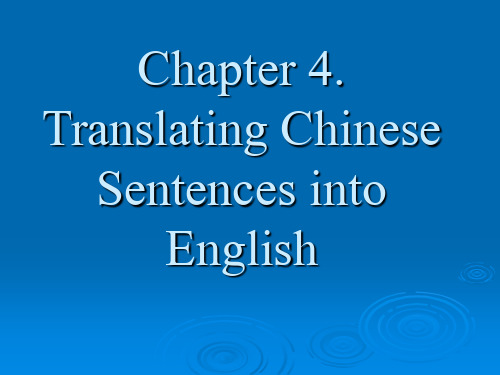
S14. 世纪之交,中国外交空前活跃。 a. The turn of the century finds China most active on
the diplomatic arena. b. At the turn of the century, Cቤተ መጻሕፍቲ ባይዱina is very active in its
S20. 沉默呵,沉默呵!不在沉默中爆发,就在沉默中 灭亡。
Silence, silence! Unless we burst out, we shall perish in this silence.
S21.起大风了。
It’s blowing hard.
Thanks for your attention!
Words of different parts of speech; can be omitted
Complex
Verbs, adjectives nouns, etc
not governed by the subject
Few conjunctive words between sentences
diplomatic activities.
S15. 一九六四年十月中国爆炸了第一颗原子弹,使世界 大为震惊。 a. China’s first atomic blast in October, 1964 was a great shock to the rest of the world. b. In October, 1964, China blasted its first atomic bomb, which shocked the rest of the world greatly.
English sentences
汉译英翻译技巧讲解二(句子的翻译1)讲课稿
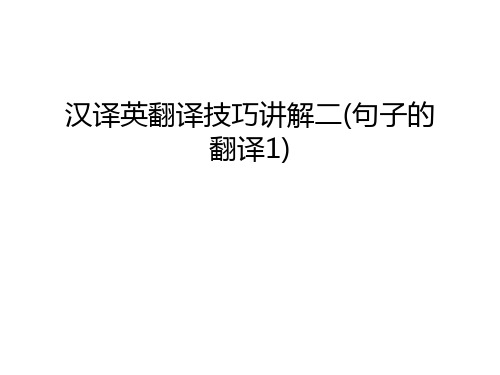
练习
1. 这个问题早就解决了。 2. 在明清期间,茶馆遍布全国。 3. 在古代,人们用中国结来记录事
件,但现在主要用于装饰。 4. 在这次表演中,所有的孩子都盛
装打扮,轮流唱歌跳舞。
练习
1. 这个问题早就解决了。
This problem has long been solved.
注解:“早就……”翻译时常用现在完成时; 句子中虽然没有表示被动的标记词,但“问题” 作为句子的主语,明显是动作的受动者,因此 用被动语态译出。
答案
2. 在明清期间,茶馆遍布全国。
During the Ming and Qing dynasties, teahouses spread all over china.
注解:“在明清期间”提示翻译时应用一般过 去时 。
练习
4. 在古代,人们用中国结来记录事件, 但现在主要用于装饰。
In ancient times, the Chinese knot was used to record events while now it is mainly used for decoration.
再例如:
好的厨师总是努力在谷物、肉类和 蔬菜之间取得平衡。
A good chef is always trying to strike a balance among grain, meat and vegetable.
注解:动词“取得”是“努力”的目的, 因此我们可以把“努力”处理成谓语, 而“取得”处理成目的状语。
The problem is being discussed.
3)当中文句子的主语过于宽泛,如 “人们”、“别人”、“这”等, 可将原文的宾语(承受者)转换成 主语,用被动语态译出,原来的主 语可省略 。
英汉翻译教程讲解第四章
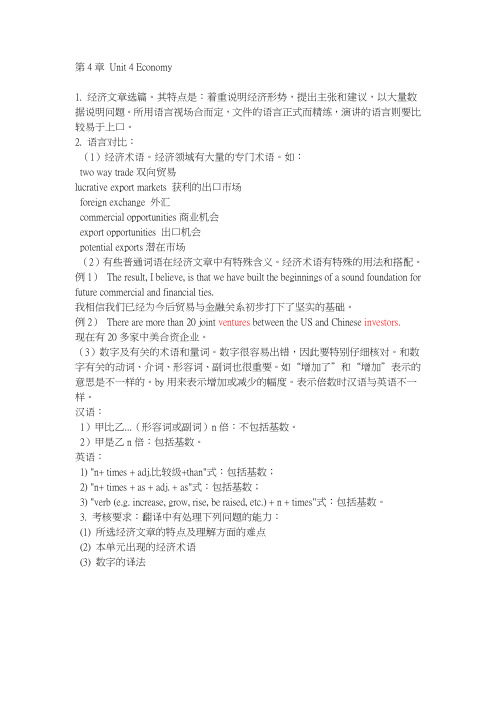
第4章Unit 4 Economy1. 经济文章选篇。
其特点是:着重说明经济形势,提出主张和建议,以大量数据说明问题。
所用语言视场合而定,文件的语言正式而精练,演讲的语言则要比较易于上口。
2. 语言对比:(1)经济术语。
经济领域有大量的专门术语。
如:two way trade双向贸易l ucrative export markets 获利的出口市场foreign exchange 外汇commercial opportunities商业机会export opportunities 出口机会potential exports潜在市场(2)有些普通词语在经济文章中有特殊含义。
经济术语有特殊的用法和搭配。
例1)The result, I believe, is that we have built the beginnings of a sound foundation for future commercial and financial ties.我相信我们已经为今后贸易与金融关系初步打下了坚实的基础。
例2)There are more than 20 joint ventures between the US and Chinese investors.现在有20多家中美合资企业。
(3)数字及有关的术语和量词。
数字很容易出错,因此要特别仔细核对。
和数字有关的动词、介词、形容词、副词也很重要。
如“增加了”和“增加”表示的意思是不一样的。
by用来表示增加或减少的幅度。
表示倍数时汉语与英语不一样。
汉语:1)甲比乙...(形容词或副词)n倍:不包括基数。
2)甲是乙n倍:包括基数。
英语:1) "n+ times + adj.比较级+than"式:包括基数;2) "n+ times + as + adj. + as"式:包括基数;3) "verb (e.g. increase, grow, rise, be raised, etc.) + n + times"式:包括基数。
英汉翻译学习Lesson4
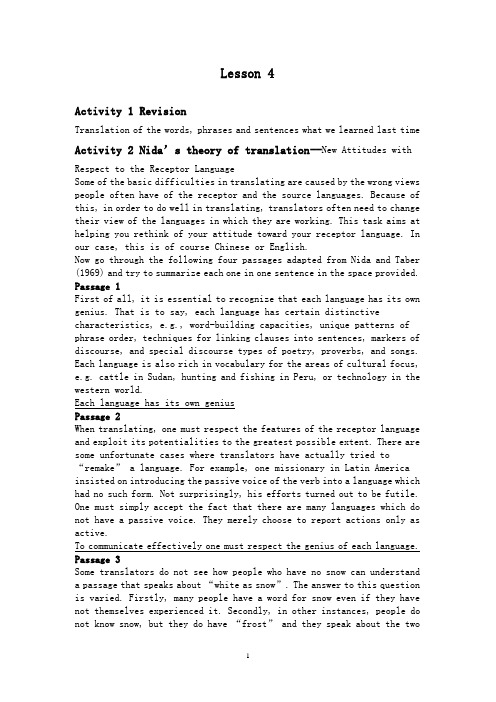
Lesson 4Activity 1 RevisionTranslation of the words, phrases and sentences what we learned last time Activity 2 Nida’s theory of translation--New Attitudes withRespect to the Receptor LanguageSome of the basic difficulties in translating are caused by the wrong views people often have of the receptor and the source languages. Because of this, in order to do well in translating, translators often need to change their view of the languages in which they are working. This task aims at helping you rethink of your attitude toward your receptor language. In our case, this is of course Chinese or English.Now go through the following four passages adapted from Nida and Taber (1969) and try to summarize each one in one sentence in the space provided. Passage 1First of all, it is essential to recognize that each language has its own genius. That is to say, each language has certain distinctive characteristics, e.g., word-building capacities, unique patterns of phrase order, techniques for linking clauses into sentences, markers of discourse, and special discourse types of poetry, proverbs, and songs. Each language is also rich in vocabulary for the areas of cultural focus, e.g. cattle in Sudan, hunting and fishing in Peru, or technology in the western world.Each language has its own geniusPassage 2When translating, one must respect the features of the receptor language and exploit its potentialities to the greatest possible extent. There are some unfortunate cases where translators have actually tried to “remake” a language. For example, one missionary in Latin America insisted on introducing the passive voice of the verb into a language which had no such form. Not surprisingly, his efforts turned out to be futile. One must simply accept the fact that there are many languages which do not have a passive voice. They merely choose to report actions only as active.To communicate effectively one must respect the genius of each language. Passage 3Some translators do not see how people who have no snow can understand a passage that speaks about “white as snow”. The answer to this question is varied. Firstly, many people have a word for snow even if they have not themselves experienced it. Secondly, in other instances, people do not know snow, but they do have “frost” and they speak about the twowith the same term. Thirdly, many languages have other equivalent idioms, e.g., “white as egret(白鹭) feathers”, or “white as fungus (菌类, 蘑菇)” (if there is an especially white form of fungus). The point is that snow as an object is not crucial to the original message. Of course if the form in which a message is expressed is an essential element of the message itself, then there is a limitation in communicating the message from one language to another.Anything that can be said in one language can be said in another, unless the form is an essential element of the message.Passage 4Since all languages differ in form, quite naturally the forms must be changed if one is to preserve the content. The extent to which the forms must be changed in order to preserve the meaning depends on the linguistic and cultural distance between the source and receptor languages. The easiest transitions occur when one translates from a language such as English into German for the two are quite similar to each other both linguistically and culturally. On the other hand, if one is translating from English into Hungarian, the formal shifts will be greater, for Hungarian belongs to a different language family than English. However, Hungarian is still part of the same cultural setting as English. Hence, the shifts are not so extreme. If however, one has to translate from English into Zulu, which belongs t the so-called Bantu family of languages and represents quite a different culture, the formal modifications must be more extreme.To preserve the content of the message the form must be changed. Naturally, a new attitude towards the receptor language implies a new view of the source language as well. We don’t have to go into the great details in this respect, for there are a lot of similarities between the attitude concerning the receptor language and that concerning the source language. It suffices (vi.足够, 有能力vt.使满足) our purpose to bear in mind the following three implications with respect to the source language. (1) The source language is subject to the same limitations as any other natural language; (2) the writers of the source language expect to be understood; and (3) the translator must attempt to reproduce the meaning of a passage as understood by the writer.Activity 3 Languages Differ: Differences in Clause OrderWe have done some serious thinking about the nature of translating. Well, to be a good translator, only serious thinking is not enough. We should also practice as hard as we can and as much as we can. In this activity, we shift our attention to examining the differences in clause order between English and Chinese and the impact this has on our translating. In Chinese, we say就要毕业的学生们仍在教室里学习 while in English the same meaning is presented as Those students who were to graduate very soonwere still studying in the classroom. In the Chinese sentence, the attributive就要毕业的 is placed before 学生们 and the adverbial 在教室里 is placed before 学习, while in the English sentence, the attributive who were to graduate very soon is put after those students and the adverbial in the classroom is put after studying.Task 1 Where to Put the AttributiveQuestions:1.In Chinese, where is an attributive put?2.In English, where is an attributive put?3.Is there a difference between the word attributive and phraseattributive concerning their positions in a sentence?(Both in English and Chinese)In English, when a word is used as an attributive to modify a noun, it is usually placed before the noun, though on some rare occasions it can also be placed after noun. In Chinese an attributive is almost always put before the noun it modifies.Now translate the following phrases into Chinese, paying special attention to the positions of the attributives.1.a well-managed company 一家管理完善的公司2.the architect’s luxurious house 建筑师的豪华住宅3.the ancient Chinese philosophers 中国古代的哲学家们4.something urgent 紧急的事情5.somewhere unknown 不为人所知的某个地方Of course, not only can single words serve as attributives, but short phrases as well. In English, when a short phrase is used as an attributive to modify a noun, it is usually placed after the noun, while in Chinese it is usually put before the noun.Now translate the following items into Chinese, again paying special attention to the positions of the attributives.1.a project of building up the first corpus of spoken Chinese in China (创立中国第一个汉语口语语料库的项目)2.a student with a lot of complaints for the university(一个对学校颇多抱怨的学生)3.particles moving round their atomic nucleus(环绕原子核运动的粒子)4.a machine able to recognize human voice(能识别人的声音的机器)5.a girl wearing a long white dress(穿着白色长裙的姑娘)6.a book easy to read(一本容易读的书)Read the textbook P23-24Conclusion: Usually in English, the word attributive is put before the noun, and the phrase attributive is put after the noun, but in Chinese, it is almost always for attributives to be put before the noun.Task 2 Where to Put the Adverbial1.In Chinese, where is an adverbial put?2.In English, where is an adverbial put?3.Is there a difference between the word adverbial which modifies an adjective and the word adverbial which modifies a verb concerning their positions in a sentence?(Both in English and Chinese)Now translate the following sentences into Chinese or English, paying special attention to the positions of the adverbials.1.She was not particularly beautiful, but she certainly left a deepimpression on everybody.(她并不是特别地美丽,但她显然给每个人都留下了深刻的印象。
英汉互译第四讲共47页

谢谢!
36、自己的鞋子,自己知道紧在哪里。——西班牙
37、我们唯一不会改正的缺点是软弱。——拉罗什福科
xiexie! 38、我这个人走得很慢,但尽全力做你应该做的事吧。——美华纳
1、不要轻言放弃,否则对不起自己。
2、要冒一次险!整个生命就是一场冒险。走得最远的人,常是愿意 去做,并愿意去冒险的人。“稳妥”之船,从未能从岸边走远。-戴尔.卡耐基。
梦 境
3、人生就像一杯没有加糖的咖啡,喝起来是苦涩的,回味起来却有 久久不会退去的余香。
英汉互译第四讲 4、守业的最好办法就是不断的发展。 5、当爱不能完美,我宁愿选择无悔,不管来生多么美丽,我不愿失 去今生对你的记忆,我不求天长地久的美景,我只要生生世世的轮 回里有你。
40、学而不思则罔,思而不学则殆。——孔子
汉英翻译教程 句子的翻译

2.将汉语的否定形式译成英语的肯定形式
1. 她抱怨名单上没有她的名字. She complained about the omission of her name from the list. 2. 他尽力克服技术资料的不足. He tries his best to overcome the lack of technical data. 3. 在收据尚未签字以前不得付款. Before the receipt has been signed, the money must not be paid. 4. 说什么我也不去. I’ll be damned if I go. 5. 干这件事情我力不胜任. To do this is beyond my ability. 6. 他决不会说出这样的话. He was the last man to say such things.
6.将汉语的否定部分进行否定成分的转译 B)汉语否定谓语,翻译时可以否定宾语
两个月过去了,但她烧伤的手臂仍不见复原的迹象. Two months had passed, but her burnt arm showed no sign of healing. 2.我们全然不了解这件事. We know nothing about the matter. 3. 在任何情况下,中国都不会第一个使用核武器. Under no circumstance should China be the first to use nuclear weapons.
举例
1.将汉语的否定形式译成英语的否定形式
1. 现在装一台电视机并不难. Nowadays it is not difficult to assemble a TV set. 2. 她一辈子没有迈出家门一步,到头来却没了自己的家. She never traveled out of her hometown in her life and has not lived in a home of her own. 3. 我不想做“女强人”. I do not want to be an intelligent and capable woman. 4. 二氧化碳不能燃烧,也不能助燃. Carbon dioxide does not burn, nor does it support burn. 5. 如果这种物质不传电,它也就不会传热. If this substance can not conduct electricity, neither will it conduct heat.
汉英翻译讲座(9)
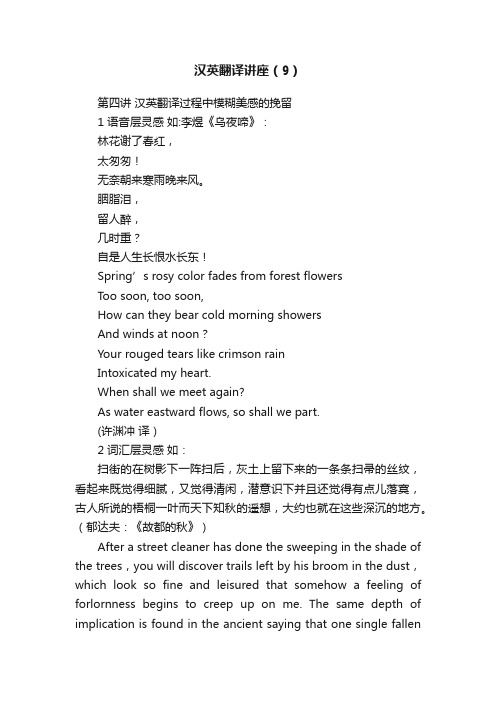
汉英翻译讲座(9)第四讲汉英翻译过程中模糊美感的挽留1 语音层灵感如:李煜《乌夜啼》:林花谢了春红,太匆匆!无奈朝来寒雨晚来风。
胭脂泪,留人醉,几时重?自是人生长恨水长东!Spring’s rosy color fades from forest flowersToo soon, too soon,How can they bear cold morning showersAnd winds at noon?Your rouged tears like crimson rainIntoxicated my heart.When shall we meet again?As water eastward flows, so shall we part.(许渊冲译)2 词汇层灵感如:扫街的在树影下一阵扫后,灰土上留下来的一条条扫帚的丝纹,看起来既觉得细腻,又觉得清闲,潜意识下并且还觉得有点儿落寞,古人所说的梧桐一叶而天下知秋的遥想,大约也就在这些深沉的地方。
(郁达夫:《故都的秋》)After a street cleaner has done the sweeping in the shade of the trees,you will discover trails left by his broom in the dust,which look so fine and leisured that somehow a feeling of forlornness begins to creep up on me. The same depth of implication is found in the ancient saying that one single fallenleaf from the phoenix tree drops a broad hint of the approaching of autumn. (毛荣贵译)3 句法层灵感如:当你走入沟中,便可见林中碧海澹荡生辉,瀑布舒洒碧玉。
- 1、下载文档前请自行甄别文档内容的完整性,平台不提供额外的编辑、内容补充、找答案等附加服务。
- 2、"仅部分预览"的文档,不可在线预览部分如存在完整性等问题,可反馈申请退款(可完整预览的文档不适用该条件!)。
- 3、如文档侵犯您的权益,请联系客服反馈,我们会尽快为您处理(人工客服工作时间:9:00-18:30)。
第四讲汉英句子翻译(一)第一部分:基本策略一、主语的确定汉语中的一些句子处于句首的并非主语。
例如:1. 以前的功课也许有一大部分是为了这张毕业文凭,不得已而做的,(从今以后,你们可以依自己的心愿去自由研究了。
)You have perhaps finished your college courses mostly for obtaining the diploma, that is, out of sheer necessity. (However, from now on you are free to follow your personal bent in the choice of studies.)2. 这几天心里颇不宁静。
I have felt quite upset recently.当然也可以译成:The last few days have found me very restless.从以上的例子可以看出,要将汉语句子译成英语时如何鉴别、确定主语是一个极为重要的问题。
鉴于汉英语言之间的差别,确定主语时,应遵循以下原则:1. 必须符合英语的语言习惯和英美等国的文化习俗;2. 必须符合英美人的思维方式;3. 必须是句中应该突出的信息;4. 必须符合句中的逻辑关系。
也就是说,处于句首的即使是主语,翻译成英语也不一定是主语,这样的译文才较为地道。
例如:1. 我们的城市在过去的十年里经历了翻天覆地的变化。
The past decade saw great changes of our city.汉语从“城市”着眼,而英语则换个角度用“时间”做主语,这样译文更生动,更符合英语表达习惯。
2. 她从来没想到他是个不诚实的人。
It never occurred to her that he was a dishonest man.汉语原文中的主语是“她”,是行为的主体,这一句子结构反映了中国人的思维方式。
在英语译文中,主语被译成“It”, 看似风马牛不相及,其实这是西方人的思维方式:这种念头从来没有闪过她的脑际。
这是西方人比较重视客观事实的例证之一。
同时,译文这样处理重点突出了“她”对“他为人不诚实”这一点而感到惊奇。
3. 我给你打国际长途就跟给楼下的李姐打电话差不多,一拨就通。
An international phone call to you is as easy as a call to Sister Li downstairs.原文的主语是“我”,而译文的主语则是“an international phone call”。
因为“国际长途电话很方便”在原文中是非常重要的信息,译文中应该放在突出的位置,而且“an international phone call”作主语可以使后面的谓语更为洗炼、简洁,也更符合英美人的表达习惯。
4. 宗教不得干预政治。
It is impermissible to interfere with politics in the name of religion.宗教本身不会发出动作干预政治,是人们/团体以宗教的名义对政治进行干预。
因此,若译为:Religion must not interfere with politics .就不符合原句中的逻辑意义了。
5. 汉字在历史上有过不可磨灭的功绩。
* Chinese characters have made indelible contributions in history.The system of Chinese characters has played an invaluable role in the history.此例是汉语中常见的拟人法语言。
拟人法的现象在汉语中常见;在英语中,多数情况下,是视为修辞上的一种毛病(不符合逻辑事实)。
因此在汉英翻译中要注意这个区别,避免受汉语字面的影响而使译文有Chinglish的味道。
6. 我们恢复和采取这些贸易方式的原因很简单:因为我们出口商品就是为了我们国外客户消费方面的需要。
*The reason for us to restore and adopt these trade practices is very simple because our export commodities are for the use and consumption of our foreign customers.The reason why we have restored and adopted these trade practices is very simple .Our export commodities are for the use and consumption of our foreign customers.汉语“……的原因是因为……”,不能译成the reason is ……because……,不符合英语逻辑。
the reason why……是地道的英语。
所以,针对中英文逻辑上的不同,翻译时行文要及时变通。
7. 笆,用竹子、柳条等编成的一种东西。
Ba is something made of bamboo or willow branches.对中国人来说,该汉语句子根本不成问题,因为整体印象是对的;但是译成英语,除了要注意“等” 此处表示“列举后煞尾”,而不是“列举未完” 之外,还必须分析:“竹子”和“柳条”是并列关系,还是选择关系?换句话说,“笆”是用“竹子”和“柳条”一起编的,还是编一物时只选其一?由于只能是后者,英语就要用or;若用and 就不对了。
二、主语与谓语的习惯搭配有些动词,在汉语里只能用于人,而在英语里,既可用于人,也可用于物。
如:汉语的“目睹”,我们只能说人“目睹”,不能说物“目睹”;而英语的see ,witness ,或escape,既可以用于指人,也可以用于物。
例如:罗马遭遇了历史上的大事件:Rome witnessed great historic events.再如:1. 我没注意到这个错误。
The mistake escaped me (or my notice).2.这个运动首先在天津开始。
Tianjin first saw the rise of the movement.但有些动词,在汉语中既可用于人也可用于物,而在英语中则只能用于物,不能用于人。
遇到这种情况,在汉译英时,我们可以采取改变谓语动词或改变主语的方法。
例如:3. 蹲在池塘边苇丛中的青蛙叫得更起劲了。
*The frogs that sat among the reeds by the pond were shouting more enthusiastically than before.The frogs that crouched among the reeds by the pond were croaking more vigorously than before. “蹲”“叫”、在汉语中既可用于人也可用于动物,但是英语“sat, shouting” 与主语frogs搭配不当;动词crouch (lower the body by bending the knees), croak (frog makes the deep low noise),用于指动物的行为。
4. 上海港不断更新设备,这个港口的生产已经面目一新。
*Now the production at this port has taken on a new look, as the workers of Shanghai port has constantly replaced old equipment with new.The workers of Shanghai port have constantly replaced old equipmentwith new and expanded its handling capacity.港口的装卸工作并不能“produce things ”,只是“move them”。
此例说明,有时我们通过改变原文主语的方法来使译文的主语与谓语搭配。
5. 任何新生事物的成长都是要经过艰难曲折的。
New things always have to experience difficulties and setbacks as they grow.此句把原文主语的定语作为译文的主语。
6. 他眼明手快。
*His eyes are bright and his hands are quick .(不符合英文逻辑)He is quick of eye and deft of hand.7. 这篇文章浅显易懂。
*This article is obvious and easy. (不符合英文逻辑)This article is easy to read and understand.8. 我对他敬而远之。
*I stand afar from him.I stand aloof from him.英语afar(far off)表达空间上的距离;而aloof (distant in feeling) 指情感上的远离,语义更准确。
三、词的增减1. 词的增补如前所述,汉语属意合语言,英语属形合语言。
汉译英时须把汉语中无需用而英语中却不可少的词增补出来。
1)增补结构词:连词,介词,代词(尤其是物主代词),冠词等群众心齐了,一切事情都好办。
When the masses are of one heart, everything becomes easy.我们应当逐步消灭城乡差别。
We should gradually eliminate the differences between town and country.她用手蒙住脸,好像是为了保护眼睛。
She covered her face with her hands, as if to protect her eyes.2) 为了使译文意思明确,增补实义词等要提倡顾全大局。
We should advocate the spirit of taking the whole situation into consideration.结婚大办宴席,实在可以免去了。
The practice of giving lavish feasts at weddings can well be dispersed with.三个臭皮匠赛过诸葛亮。
Three cobblers with their wits combined are superior to Zhuge Liang the master mind.2.词的省略1)省略重复词:汉语结构词(虚词)用得少,但为了讲究句子的平衡、气势、韵调等,常常重复实词——名词、动词、形容词等;而英语恰恰相反:一般来说,结构词不能少,实词却很少重复。
